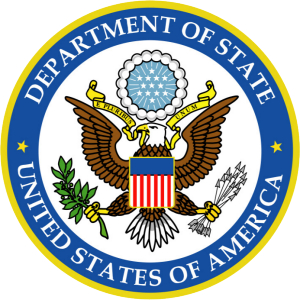 The situation of the Baha’is of Iran dominates the 2009 report on international religious freedom on Iran issued by the U.S. Department of State, with more than 100 references.
The situation of the Baha’is of Iran dominates the 2009 report on international religious freedom on Iran issued by the U.S. Department of State, with more than 100 references.
Editor’s Note: The report is long and with many details, including a chronology of some actions against the Baha’is in Iran. For the full report please see: http://www.state.gov/g/drl/rls/irf/2009/index.htm and select Iran from the section on Near East and North Africa
October 26, 2009
During the reporting period, respect for religious freedom in the country continued to deteriorate. Government rhetoric and actions created a threatening atmosphere for nearly all non-Shi’a religious groups, most notably for Baha’is, as well as Sufi Muslims, evangelical Christians, and members of the Jewish community. Reports of government imprisonment, harassment, intimidation, and discrimination based on religious beliefs continued during the reporting period. Baha’i religious groups reported arbitrary arrest and prolonged detention, expulsions from universities, and confiscation of property. Government-controlled broadcast and print media intensified negative campaigns against religious minorities, particularly the Baha’is, during the reporting period. All non-Shi’a religious minorities suffered varying degrees of officially sanctioned discrimination, particularly in the areas of employment, education, and housing.
…
Recent unofficial estimates from religious organizations claim that Baha’is, Jews, Christians, Sabean-Mandaeans, and Zoroastrians constitute 2 percent of the population. The largest non-Muslim minority is the Baha’is, who number 300,000 to 350,000.
…
Applicants for public sector employment are screened for their adherence to and knowledge of Islam, although members of religious minorities could serve in lower ranks of government employment, with the exception of Baha’is.
…
The legal system discriminates against religious minorities. Article 297 of the amended 1991 Islamic Punishments Act authorizes collection of equal “blood money” (diyeh) as restitution to families for the death of both Muslims and non-Muslims. Prior to a 2004 change, the law gave a lesser monetary amount as “blood money” for non-Muslims. Baha’is and Sabean-Mandaeans, in addition to women, are excluded from the equalization provisions of the bill. According to law, Baha’i blood is considered mobah, meaning it can be spilled with impunity.
…
The Government considers Baha’is to be apostates and defines the Baha’i Faith as a political “sect.” The Ministry of Justice states that Baha’is are permitted to enroll in schools only if they do not identify themselves as such, and that Baha’is preferably should be enrolled in schools with a strong and imposing religious ideology. There were reports that Baha’i children in public schools faced attempts to convert them to Islam.
…
The Ministry of Justice states that Baha’is must be excluded or expelled from universities, either in the admission process or during the course of their studies, if their religious affiliation becomes known. University applicants are required to pass an examination in Islamic, Christian, or Jewish theology, but there was no test for the Baha’i theology.
Baha’is are banned from the social pension system. In addition, Baha’is are regularly denied compensation for injury or criminal victimization and the right to inherit property. Baha’i marriages and divorces are not officially recognized, although the Government allows a civil attestation of marriage to serve as a marriage certificate.
…
Baha’i groups reported that the Government often denied applications for new or renewed business and trade licenses to Baha’is. The Government repeatedly pressured Baha’is to accept relief from mistreatment in exchange for recanting their religious beliefs. The Government prevented many Baha’is from leaving the country.
…
Broad restrictions on Baha’is severely undermined their ability to freely practice their faith and function as a community. Baha’i groups reported that the Government often denied applications for new or renewed business and trade licenses to Baha’is. The Government repeatedly pressured Baha’is to accept relief from mistreatment in exchange for recanting their religious beliefs. The Government prevented many Baha’is from leaving the country.
…
During the reporting period, Baha’is continued to face an increasing number of public attacks, including a series of negative and defamatory articles in Kayhan, a government-affiliated newspaper whose managing editor was appointed by Supreme Leader Ayatollah Khamene’i. The national daily newspaper Etemad and several provincial newspapers also published defamatory articles against Baha’is. The articles often accused Baha’i and Sunni Salafist groups of working together to undermine national security and to commit espionage on behalf of foreign governments. State-run media reported that on May 19, 2009 Majles member Hojjatoleslam Mohammad-Ebrahim Nekounam told a session of Parliament that Baha’ism was established to “infiltrate Iran” and “create divisions” among Muslims and that members of the Baha’i community throughout the country were working toward those goals. In February 2009 the semiofficial Fars News Agency reported that the Prosecutor General sent a letter to the Minister of Intelligence warning that Baha’is had “extensive and established ties with the Zionist regime and their members try to collect information, carry out infiltration activities, and destroy people’s belief in Islam.” During the reporting period, articles in the state-run media alleged that Baha’ism encourages its followers to commit incest with close family members.
…
October 29, 2009 9:47 pm
Governments and organizations have had a long time to correct their misunderstandings of the situation, each report being a draft of the next one, since the facts remain the same. By now, even a new tactic against the Baha’is would be laughed at (not in open terms, of course).